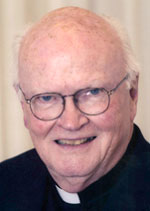The overwhelmingly positive worldwide response to the person, example and message of Pope Francis serves as a reminder that Christianity is a movement, not a monument.
It all began when a charismatic young man left his home town of Nazareth and started to walk country roads and shorelines inviting others to follow him. He asked fishermen to drop their nets and respond to his invitation to become fishers of men and women. He preached good news of salvation and established his credentials by miraculous actions and compassionate care for those in need.
At the beginning of his public ministry, as Luke’s Gospel relates it, Jesus returned “to Nazareth, where he had grown up, and went according to his custom into the synagogue on the Sabbath day. He stood up to read and was handed a scroll of the prophet Isaiah.”
Jesus then unrolled the scroll and read these famous words: “The Spirit of the Lord is upon me, because he has anointed me to bring glad tidings to the poor. He has sent me to proclaim liberty to captives and recovery of sight to the blind, to let the oppressed go free, and to proclaim a year acceptable to the Lord.”
[hotblock]
And after reading those words, he said to all present, “Today this Scripture passage is fulfilled in your hearing.”
And thus the movement began. Eventually, however, over the centuries, the movement hardened into a monument of hierarchical structure, ecclesiastical rules and regulations, and architectural rigidities.
Not to say that structure isn’t necessary. If anyone reading this did not have a bone structure, he or she would be a puddle of flesh plopped on the floor. Nor can a worldwide community of 1.2 billion believers live without some rules and regulations. And, of course, if believers are expected to remember their Lord in the breaking of the bread, they have to have a place, some sacred space, where they can assemble and worship.
But rigidities of rank, rule and building construction can cripple the movement and replace it with monumental cathedrals, chancery offices, rectories, a promotion culture and brick-and-mortar barriers to the flow of loving people and liberating ideas that Jesus launched.
By taking the name Francis, our present Holy Father signaled his desire to see the values of Francis of Assisi, the “poverello,” surface as defining characteristics of this movement called Christianity.
By paying his own hotel bill at the end of the conclave that elected him to the chair of Peter and by choosing to live in simple quarters rather than a papal palace, Pope Francis said “no” to privilege and “yes” to the lifestyle adopted by the Son of Man who came, not “to be served but to serve and to give his life as a ransom for many” (Mk 10:45).
His words and actions have caught the attention of a world in need of the simplicity he witnesses to consistently and cheerfully. And the world appears to be saying “amen” to what he has to offer.
***
Jesuit Father Byron is university professor of business and society at St. Joseph’s University, Philadelphia. Email: wbyron@sju.edu.
PREVIOUS: Life inside and outside the chapel at St. Charles Seminary
NEXT: Might a child’s death also mean end of a marriage?



Share this story